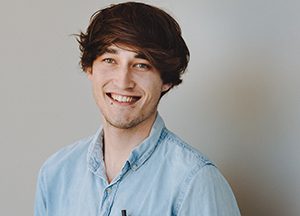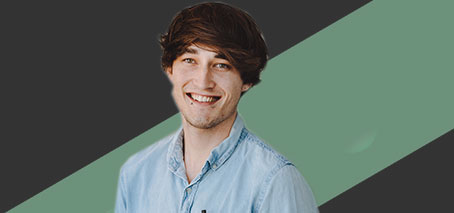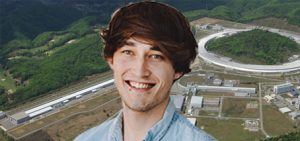
FLEET alumni Dr Oliver Paull
FLEET node : UNSW
FLEET supervisor: Nagarajan (Nagy) Valanoor
FLEET project/theme: Topological materials
Date completed PhD: July 2022
Oliver Paull was one of the original cohort of FLEET PhD students when the Centre was launched in 2017. We interviewed Oliver about his career path after leaving FLEET (Oliver completed his PhD in July 2022), and how he has used his technical and collaboration training at FLEET in his new position as a postdoc at Unité Mixte de Physique, France.
Questions are by FLEET training coordinator Jason Major and Communications Chair Kirrily Rule.
FLEET: What role did you take after you completed your PhD in FLEET?
Oliver: I moved overseas to France for a postdoctoral position at Unité Mixte de Physique, CNRS/Thales
FLEET: What impact has FLEET had on your career?
Oliver: FLEET has given me a broad perspective of the direction of my research field (which is hard to understand when you enter it!) and how it can be applied to technology to achieve low-energy electronics. It has also shown me the importance of why we are working towards this goal. Working within FLEET for my PhD gave me the feeling I was part of a research effort much bigger than just myself or the research group I was in.
FLEET: How do you think the training and knowledge you received in FLEET has set you up for your current role?
Oliver: My training and knowledge through my PhD supervisors and FLEET has been very helpful for my current post-doctoral position. Obviously all the technical training I developed in my PhD (related to FLEET and otherwise) has been incredibly useful for my post-doc, but I think understanding the landscape and how different areas of physics can be used in technology has been one of the most insightful lessons. On top of this, being introduced to a number of different experimental techniques and measurements by other groups in FLEET have given me more clarity in the types of measurements I do now.
In FLEET, I learned about different physical phenomena which could be manipulated to achieve low-energy electronics technologies. In my current position, I am actively working on this topic, specifically in relation to controlling spin-to-charge conversion at Rashba interfaces using the electric field from an adjacent ferroelectric material. My boss Manuel Bibes is one of the founders of a start-up implementing this physics in a device (see more at nellow.eu).
I also gained more experience with cross-node collaboration, such as sending samples to other FLEET nodes for certain experiments.
Collaboration has been a key ingredient in my post-doc, which has been enabled through the development of these skills during my PhD and FLEET. I currently work between a group in Paris and another group in Grenoble where I use pulsed laser deposition (PLD) and molecular beam epitaxy (MBE) at each institution then bring the samples together using a transfer process. The progress and success of this type of project relies on clear communication with both groups, careful planning, and flexibility.
FLEET: What is your fondest memory of your time in FLEET?
Oliver: I think the end-of-year workshops were always a highlight. You are able to see the progress everyone has made across the whole centre and interact with everyone in a welcoming environment.
I think the moment at FLEET I’m proudest of would be when I was co-organising the ANSTO Young Researchers Conference and was able to get the FLEET outreach coordinator at the time – Dianne Ruka – to come and talk to the presenters of the conference during the conference dinner. The pride from this moment didn’t come from a scientific origin but more an inter-community collaboration where I was able to bring two separate areas in my professional life together in a nice way.
Thanks Oliver for sharing your experiences! FLEET is extremely proud of those members who have moved on to great careers, making use of skills developed in their time at FLEET. Ultimately it will be FLEET alums as much as research outputs that define the success of the Centre. See other FLEET alumni at FLEET.org.au/alumni




